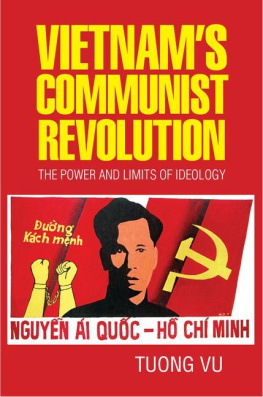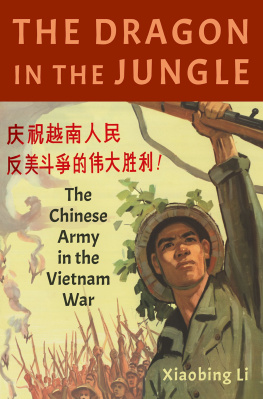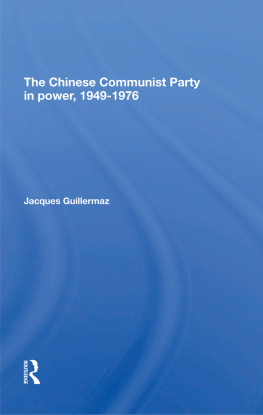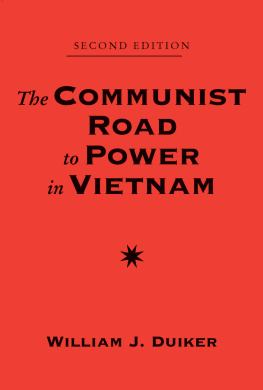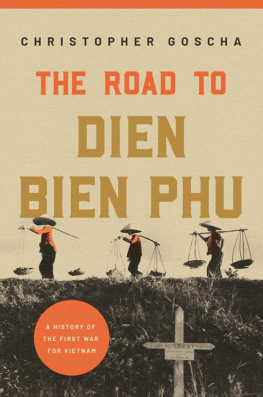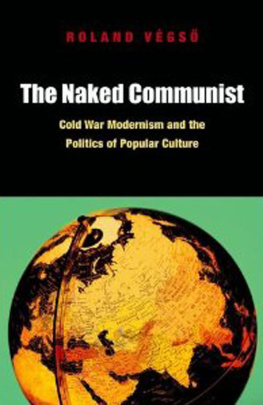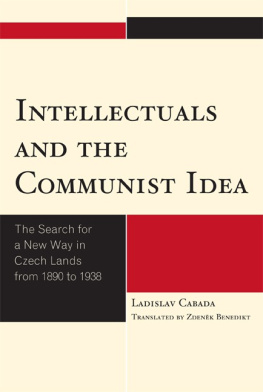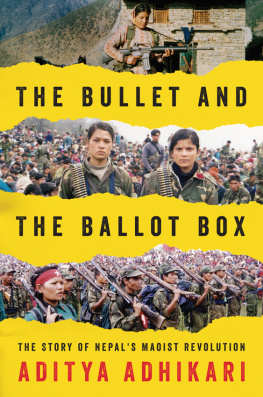Tuong Vu - Vietnam’s Communist Revolution The Power and Limits of Ideology
Here you can read online Tuong Vu - Vietnam’s Communist Revolution The Power and Limits of Ideology full text of the book (entire story) in english for free. Download pdf and epub, get meaning, cover and reviews about this ebook. City: New York, year: 2017, publisher: Cambridge University Press, genre: History. Description of the work, (preface) as well as reviews are available. Best literature library LitArk.com created for fans of good reading and offers a wide selection of genres:
Romance novel
Science fiction
Adventure
Detective
Science
History
Home and family
Prose
Art
Politics
Computer
Non-fiction
Religion
Business
Children
Humor
Choose a favorite category and find really read worthwhile books. Enjoy immersion in the world of imagination, feel the emotions of the characters or learn something new for yourself, make an fascinating discovery.
Vietnam’s Communist Revolution The Power and Limits of Ideology: summary, description and annotation
We offer to read an annotation, description, summary or preface (depends on what the author of the book "Vietnam’s Communist Revolution The Power and Limits of Ideology" wrote himself). If you haven't found the necessary information about the book — write in the comments, we will try to find it.
Tuong Vu: author's other books
Who wrote Vietnam’s Communist Revolution The Power and Limits of Ideology? Find out the surname, the name of the author of the book and a list of all author's works by series.
Vietnam’s Communist Revolution The Power and Limits of Ideology — read online for free the complete book (whole text) full work
Below is the text of the book, divided by pages. System saving the place of the last page read, allows you to conveniently read the book "Vietnam’s Communist Revolution The Power and Limits of Ideology" online for free, without having to search again every time where you left off. Put a bookmark, and you can go to the page where you finished reading at any time.
Font size:
Interval:
Bookmark:
Vietnams Communist Revolution
By tracing the evolving worldview of Vietnamese communists over eighty years as they led Vietnam through wars, social revolution, and peaceful development, this book shows the depth and resilience of their commitment to the communist utopia in their foreign policy. Unearthing new material from Vietnamese archives and publications, this book challenges the conventional scholarship and the popular image of the Vietnamese revolution and the Vietnam War as being driven solely by patriotic inspirations. The revolution saw not only successes in defeating foreign intervention, but also failures in bringing peace and development to Vietnam. This was, and is, the real Vietnam Tragedy. Spanning the entire history of the Vietnamese revolution and its aftermath, this book examines its leaders early rise to power, the tumult of three decades of war with France, the United States, and China, and the dismal legacies left behind, which still influence Vietnams foreign policy today.
Tuong Vu is Director of Asian Studies and Professor of Political Science at the University of Oregon. A native of Vietnam, he has published extensively on Vietnamese politics and history, Cold War history, and East Asian politics. Vu served on the editorial board of the Journal of Vietnamese Studies during 20062014. His first book, Paths to Development in Asia: South Korea, Vietnam, China, and Indonesia , received a 2011 Bernard Schwartz Award Honorable Mention.
Paul Thomas Chamberlin, Columbia University
Lien-Hang T. Nguyen, Columbia University
This series showcases cutting-edge scholarship in US foreign relations that employs dynamic new methodological approaches and archives from the colonial era to the present. The series is guided by the ethos of transnationalism, focusing on the history of American foreign relations in a global context rather than privileging the United States as the dominant actor on the world stage.
Vietnams Communist Revolution
The Power and Limits of Ideology
Tuong Vu
University of Oregon


One Liberty Plaza, New York NY 10006, USA
Cambridge University Press is part of the University of Cambridge.
It furthers the Universitys mission by disseminating knowledge in the pursuit of education, learning, and research at the highest international levels of excellence.
www.cambridge.org
Information on this title: www.cambridge.org/9781316607909
Tuong Vu 2017
This publication is in copyright. Subject to statutory exception and to the provisions of relevant collective licensing agreements, no reproduction of any part may take place without the written permission of Cambridge University Press.
First published 2017
Printed in the United States of America by Sheridan Books, Inc.
A catalogue record for this publication is available from the British Library.
ISBN 978-1-107-15402-5 Hardback
ISBN 978-1-316-60790-9 Paperback
Cambridge University Press has no responsibility for the persistence or accuracy of URL s for external or third-party Internet Web sites referred to in this publication and does not guarantee that any content on such Web sites is, or will remain, accurate or appropriate.
This is not a book I intended to write; fortuitous circumstances and generous support from colleagues and institutions came together to nudge me along, chapter by chapter, over ten years. Three scholars who have influenced this project the most are Peter Zinoman, Keith Taylor, and Chris Goscha. Peter Zinoman taught me to write as a historian and offered valuable comments on many chapters. Keith Taylors scholarship is a great source of inspiration. Chris Goschas invitation to participate in a Euroseas conference in Paris in 2004 had me put my thoughts on the topic together for the first time. Im indebted to Chris for giving me so many helpful suggestions besides the chance to start the project. Im also grateful to the encouragement from many fellow panelists at that conference, including Christian Ostermann, the late Ilya Gaiduk, Chen Jian, and Nayan Chanda. This Euroseas paper eventually became of this book.
In the same spirit, I greatly appreciate historian Sergey Glebov who encouraged me to write an article for the journal Ab Imperio: Studies of New Imperial History and Nationalism in the Post-Soviet Space . Parts of this article were included in of this book. Smith College deserves thanks for offering me generous support through a Mendenhall Fellowship, which contributed greatly to my research for this book.
Two other institutions awarded year-long fellowships that enabled me to complete the bulk of the project. The Asia Research Institute (ARI), National University of Singapore, provided substantial funding and a collegial working environment during 20072008. ARIs directors, Anthony Reid, John Gavin, and Lily Kong, deserve credit for their support of this project. Jamie Davidson, Karl Hack, Huang Jianli, SR Joey Long, Anthony Reid, Nicolai Volland, Geoff Wade, Wasana Wongsurawat, Leong Yew, and other colleagues offered insightful comments on papers that would be included in this study. David Koh and Pham Nhu Quynh made Singapore feel like home.
Im indebted to Princeton Institute of International and Regional Studies (PIIRS), Princeton University, for offering me a Development and Democracy Fellowship during 20112012. Atul Kohli deserves special thanks for suggesting the fellowship, arranging a talk on the project, reading chapters of the manuscript, and giving me meticulous feedback. Deborah Yashar and Mark Beissinger also were very kind and generous with their time and advice. Im also thankful to my former Princeton professors Lynn T. White III and Miguel Centeno for discussing this project with me.
The Naval Postgraduate School and the University of Oregon deserve great thanks for having provided substantial funding that enabled me to make many research trips to Vietnam. Im grateful to Mr. Ed Colligan, an alumnus of the Department of Political Science at the University of Oregon, for supporting a department award of which I was a recipient. Im indebted to colleagues in Oregon, especially Deborah Baumgold, Erin Beck, Gerry Berk, Dan HoSang, Karrie Koesel, Joe Lowndes, Craig Parsons, Priscilla Southwell, Dan Tichenor, and Priscilla Yamin for their enthusiasm about the project.
Lien-Hang Nguyen was a firm supporter from early on. Ed Miller read the entire manuscript and made numerous excellent suggestions on structure and arguments in a truly comradely spirit. Jacques Hymans was enthusiastic and gave valuable advice for framing the main arguments. Ben Kerkvliet is the best mentor one can ever hope for. Pierre Asselins very helpful advice on the project is greatly appreciated. Sophie Quinn-Judge and Kosal Path kindly provided important archival and other materials. In the process of revising, I received very helpful comments from Kosal Path, Zachary Shore, and Lewis Stern that significantly improved the arguments. At the University of Oregon, I benefited greatly from Glenn Mays wise advice and unfailing support. Other friends and colleagues who helped sustain my interest in Vietnamese studies were Haydon Cherry, Olga Dror, Erik Harms, Tuan Hoang, Alec Holcombe, Charles Keith, Liam Kelley, Ben Kerkvliet, Christian Lentz, Martin Loicano, Ken MacLean, Shawn McHale, Martina Nguyen, Phan Nhien Hao, Gerard Sasges, Balasz Szalontai, Keith Taylor, Philip Taylor, Alex Thai-Vo, Nu-Anh Tran, and Alex Vuving.
Font size:
Interval:
Bookmark:
Similar books «Vietnam’s Communist Revolution The Power and Limits of Ideology»
Look at similar books to Vietnam’s Communist Revolution The Power and Limits of Ideology. We have selected literature similar in name and meaning in the hope of providing readers with more options to find new, interesting, not yet read works.
Discussion, reviews of the book Vietnam’s Communist Revolution The Power and Limits of Ideology and just readers' own opinions. Leave your comments, write what you think about the work, its meaning or the main characters. Specify what exactly you liked and what you didn't like, and why you think so.

